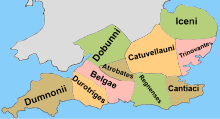Icener
The Iceni ( Iceni ) were a Celtic tribe that in what is now Norfolk and Suffolk in Britain lived.
Culture
The settlement area of the Iceni bordered in the northwest on the Wash , on that of the Corieltavi and in the south on that of the Trinovanten . Archaeological finds show a distinctive culture and highly developed social structure of this people. It is known about the Iceni beliefs that they worshiped a goddess of victory named Andraste .
history
After the Roman invasion of Britain in 43 AD under Emperor Claudius , the Iceni first allied with Rome. At that time, a certain Antedios was ruler of the Iceni, who probably also signed the first treaty with Rome. There was hardly any economic exchange with the new occupiers, as the Iceni feared a loss of their values. This distancing from Roman culture contributed to a bad relationship.
The first clashes with the Romans were triggered by the governor Publius Ostorius Scapula in 47, who decided to disarm suspicious tribes and increase military control by building new military camps. Despite their relative independence, the Iceni were among the tribes that were now exposed to greater pressure and began an uprising. In the course of the battle (probably at Stonea Camp in Cambridgeshire ), in which mainly allied British tribes fought on the Roman side, the Iceni insurgents were wiped out.
A ruler of the Iceni named Prasutagus was given the status of a vassal king by the Romans . After his death around 60, the tribe and other allies were led by Prasutagus' wife, the Icenian Queen Boudicca , in an ultimately unsuccessful uprising , to which the Roman cities of Camulodunum ( Colchester ), Londinium ( London ) and Verulamium ( St Albans ) contributed Victims fell. However, after the crushing defeat on Watling Street in 61, in which over 150,000 Britons (including the family members who accompanied the insurgents) were alleged to have been killed, the Iceni land was again placed under military occupation.
Since, according to Roman information, the insurgents did not take care of the sowing , it is said to have resulted in a famine that claimed further deaths. Under the Roman rule of Agricola from 77 to 83/84, his iuridicus (an expert in legal and constitutional matters) C. Salvius Liberalis helped the Icenians in the transition from a military government by the Romans to a renewed civil and autonomous administration. At the same time the last Roman soldiers were withdrawn from the region.
At the end of the 1st century the Iceni had their own capital called Venta Icenorum in what is now Caistor St. Edmund.
See also: List of Celtic Tribes
literature
- Paul R. Sealey: The Boudican Revolt against Rome (= Shire Archeology 74). Shire Books, Prines Risborough 2004, ISBN 0-7478-0618-7 .
